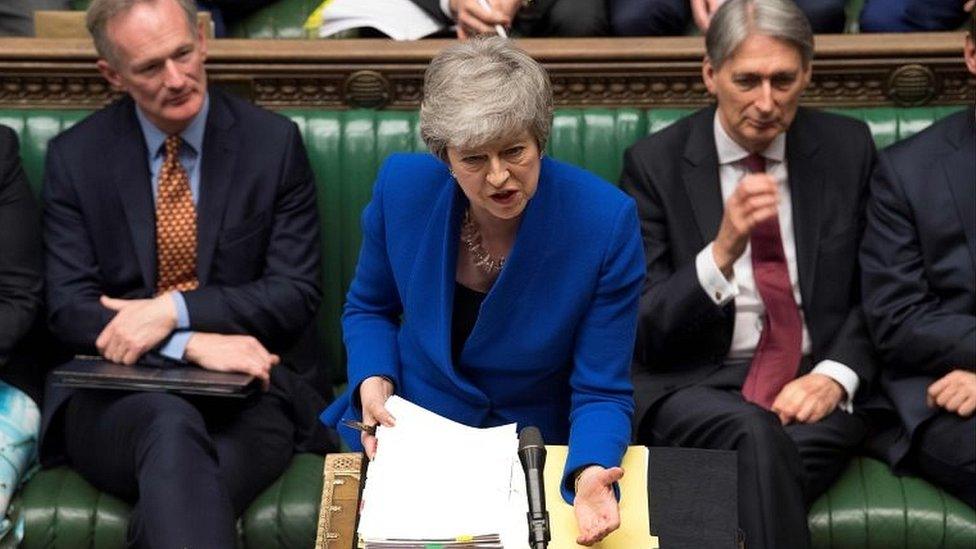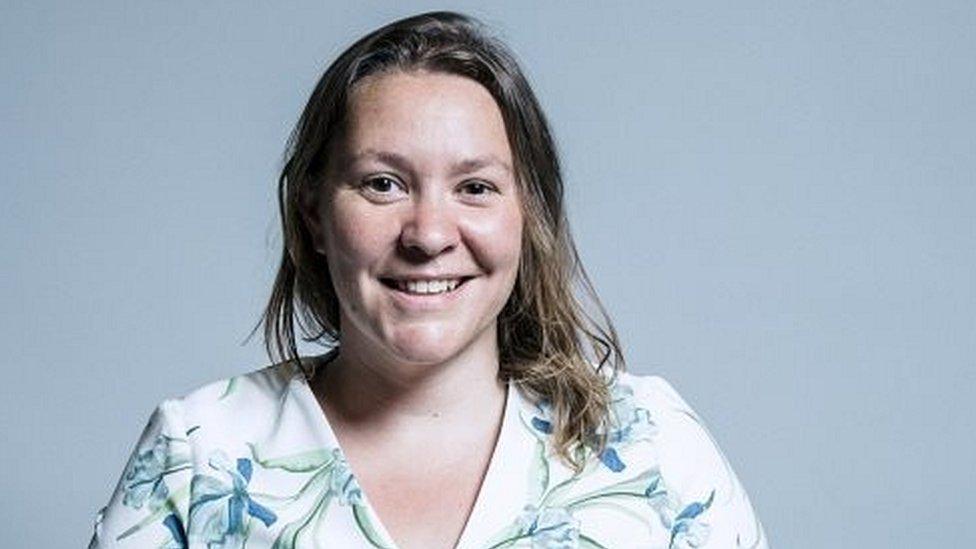Week ahead in Parliament
- Published

Bland. Soothing. Routine. The parliamentary agenda for the coming week keeps MPs and peers in a kind of holding pattern while the government figures out its next moves on Brexit.
But looming at the end of the week is an extra-parliamentary event that could transform the political mood and send events careening out of control.
The local elections due across most of England (but not in London or Northamptonshire) will provide MPs with some hard evidence of what voters are thinking in their particular patch... and it may make for uncomfortable conclusions.
While the European elections due on 23 May have attracted more comment because of the bizarre circumstances around them, the local elections will feel a lot more personal.
Local councillors are key members of any local political machine. The machine is happy if they win, delighted if they win handsomely and angry and vengeful if they are defeated.
And in the current febrile climate no-one really knows what message the voters, in their infinite wisdom, will send. No party feels safe.
The relatively light Commons agenda this week will allow MPs to spend time with their local troops, knocking on doors and communing with their constituents, so expect the Commons chamber to look rather depopulated for much of the week.
And expect even those who're planning rebellion to keep their powder dry until after polling day.
Here's my rundown of the week ahead:
Monday 29 April
MPs begin their week (14:00 BST) with education questions. And expect the usual crop of post weekend ministerial statements and urgent questions to follow, from 15:30.
The day's scheduled main business is motions to approve a series of Statutory Instruments to maintain various sets of international sanctions after Brexit - the four SIs cover chemical weapons, Zimbabwe, the Republic of Belarus and Syria.
There's also a motion to swap the SNP's representative on the Intelligence and Security Committee, replacing their Westminster leader, Ian Blackford, with the party's former Deputy leader, Stewart Hosie. This should go through on the nod, but marks some rehabilitation for one of the SNP's longer-serving MPs.
In Westminster Hall, MPs will debate a petition urging the government to make online abuse a specific criminal offence and create a register of offenders.

Katie Price's son Harvey has been trolled on social media
The petition was started by Katie Price, following social media trolling of her son, Harvey who has multiple disabilities, and it attracted 221,914 signatures before it closed early due to the 2017 general election.
On the Committee Corridor (14:15) the Liaison Committee (the super-committee of select committee chairs) starts taking evidence on the effectiveness and influence of the select committee system, with Professor Tony Wright, the former Labour MP who is the architect of the current system under which MPs elect the committee chairs.
The committee will hear from a formidable array of think tanks, civil servants and commentators, with a view to identifying whether extra powers and further changes to the system are required. This all looks rather inward looking, but the rapid increase in the prestige and effectiveness of Commons committees since 2010 is one of Westminster's real good news stories, and the search is on for ways to build on it.
Meanwhile, the Public Accounts Committee (16:00) will examine "planning and the broken housing market", asking senior civil servants from the Ministry of Housing, Communities and Local Government how they plan to build 300,000 new homes a year from the mid-2020s.
In the Lords (14:30) questions to ministers include Labour's Baroness Bakewell asking about the impact of religious schools' admission policies on those schools
Then peers debate two reports from the Economic Affairs Select Committee; Making Tax Digital for VAT: Treating Small Businesses Fairly; The Powers of HMRC: Treating Taxpayers Fairly - Lord Forsyth of Drumlean
Finally, there will be a short debate on reviewing the role of police and crime commissioners. The Conservative peer and historian Lord Lexden has a motion calling for the government to review their performance, eight years after the posts were created. He says there is a "striking need for improvement" on the part of many PCCs - not least to convince a sceptical electorate that the posts are justified. This marks a widening of his campaign over Wiltshire Police's conduct of Operation Conifer, the investigation into historic allegations against the former Prime Minister Sir Edward Heath.
Tuesday 30 April

Labour's Anna Turley has secured a debate on the closure of a rape crisis centre
The Commons day opens (11:00) with Business, Energy and Industrial Strategy Questions.
The day's Ten Minute Rule Bill, from Conservative Alex Chalk, would require the UK to reach net zero carbon emissions by 2050. Mr Chalk has signed up a series of Conservative backbenchers behind a measure that he says is essential to "stop the planet from reaching devastating tipping points".
His bill would commit the UK to reducing its greenhouse gases to net zero by 2050, which means any lingering emissions would be balanced out by, for example, planting trees to suck carbon out of the atmosphere as they grow. He argues the scientific evidence shows that there are serious risks in not acting, and that there would be "exceptional opportunities" from growing clean British industries.
The day's main legislation is the Second Reading debate on the National Insurance Contributions (Termination Awards and Sporting Testimonials) Bill - a not very controversial tidying-up measure to close a loophole which incentives employers to disguise final payments as compensatory termination payments that are exempt from National Insurance Contributions. It is hard to see this taking up a whole Commons afternoon - which suggests that MPs will either be taking an early bath, or will have some extra business added to their agenda.
In Westminster Hall debates include Labour MP Anna Turley raising the closure of a local rape crisis centre which deals with hundreds of cases a year, following funding cuts by the Ministry of Justice (11 :00) and the Labour MP Seema Malhotra discussing the contribution of Sikhs to the UK as part of Sikh history awareness month (14:30).
At 16:00 Conservative former minister George Eustice leads a debate on the composition of the Migration Advisory Committee. He will argue that the current MAC is too narrow and gives poor advice, because all five of its members are economists and university lecturers, and there are no employers or trade union representatives or people with knowledge of community cohesion or international relations. He rejects the "skills-based" approach to immigration, and says the government should recognise the need for migrants who might be on lower incomes and have fewer formal qualifications. As a result, he believes the MAC should be disbanded and reconstituted to have broader expertise.
My committee pick is the Public Administration and Constitutional Affairs session on the Role of Parliament in the UK Constitution: Authorising the Use of Military Force (10:00) with former foreign secretaries Jack Straw and William Hague. Ever since the Iraq war, and particularly since the Commons rejected intervention in Syria during the coalition years, there have been voices calling for an American-style War Powers Act to codify the government's powers to commit British forces to military action.
Watch out, too, for the Home Affairs session on Serious Violence (10:00), which will focus on knife crime and violence against young people. It will examine possible causes and contributory factors, including cuts to policing and youth services, school exclusion and the drugs market. One interesting witness will be Labour MP Vicky Foxcroft, one of the driving forces behind the cross-party Youth Violence Commission. It will also discuss the government and police response, and the Serious Violence Strategy.
In the Lords (14:30) peers will debate a report from their Privileges and Conduct Committee proposing significant changes to their complaints and grievance scheme: the report would reform the way the House handles allegations of bullying, harassment or sexual misconduct against peers. It would bring in independent investigators to assist the independent commissioner. The commissioner rather than a committee of members would propose punishments for breaches of the code, and a new Conduct Committee - with external Members with full voting rights - would hear appeals. One key change proposed is that reports of the Conduct Committee would not be debated in the House - important after the controversy over the case of Lord Lester.
Then peers will debate the government's Online Harms White Paper - and there will also be a short debate on the transport infrastructure needs of the UK's Innovation Corridor (London, Stansted, Cambridge) led by Lord Haselhurst (former MP for Saffron Walden - right in the middle of said corridor).
Wednesday 1 May
The Commons kicks off (11:30) with International Development Questions, which might include some speculation about when the government will replace Alistair Burt, the minister for the Middle East, who was shared between the Foreign Office and DfID. His post has, conspicuously, not been filled, leading to rumours of a rapid return to the colours.
Then comes Prime Minister's Question Time (12:00) where the impending local elections may produce heated cross-party exchanges, while limiting the attacks against Theresa May from her own benches.
The Ten Minute Rule Bill from Labour's Ann Clwyd would require police officers to be trained in autism awareness (something already done by South Wales Police).
Then comes a Labour Opposition Day Debate, on a subject to be announced
The Adjournment debate, led by Labour's Carolyn Harris, is on the Children's Funeral Fund. She and the Conservative John Hayes have been campaigning on issues around funerals for people on benefits for some time.
In Westminster Hall, subjects for debate include: District council finances (9:30); the effect on landowners of the proposed England Coastal Path (11:00) and the contribution of the Jain community to the UK (16:00).
On the Committee Corridor, the Liaison Committee has one of its regular sessions questioning the prime minister, where the subject matter will include the current position on Brexit, trade and the economy; and security and border issues.
Earlier, the Women and Equalities Committee has a session on health and social care and LGBT communities (9:50), examining why health outcomes are worse for LGBT people and looking at discrimination in primary and social care
In the Lords (15:00) peers open with an interesting series of questions to ministers, covering the decision of the Lord Mayor's Show 2019 to decline an application to participate by the government of Taiwan and the introduction of Sharia law in Burma
Peers then consider a series of Brexit-related SIs on international sanctions against Burma, Venezuela, Iran and Guinea-Bissau, before moving on to a short debate on the governance, operations and performance of the Student Loans Company
Thursday 2 May
The Commons begins with Transport Questions (9:30) followed by the weekly Business Statement from the Leader of the House, Andrea Leadsom. Will she announce the government's next legislative move on Brexit, perhaps scheduling a Second Reading debate on the Withdrawal Agreement Bill, and defying Labour to vote against it?
There has been some speculation that the government might also introduce the Restoration and Renewal Bill, the measure which would set up the organisation which would then run the proposed £4bn revamp of the Victorian Palace of Westminster, the iconic home of Parliament. The leader did suggest that the bill will be appearing soon - but it is not yet in the current week's rather thin-looking schedule, even though the pre-Easter flooding of the Commons chamber, and the Notre-Dame fire in Paris have given added urgency to concerns about the state of the building.
The main event is a general debate about World Immunisation Week
In Westminster Hall there are debates on preventing serious injury and fatalities while working at height (13:30) and on Sharia law courts in the UK (15:00).
In the Lords (11:00) questions to ministers include the surgeon, Lord McColl of Dulwich, asking about the national system recording the number of, the treatment received by, and the dates of treatments for, new amputees attending limb fitting centres in England, and the Bishop of St Albans asking about the impact of rural crime on farming communities
The day's main debates are on the government's legal responsibility to reduce greenhouse gas emissions and the implications for global security and stability and for the world economy of continuing climatic changes and then on tackling antimicrobial resistance 2019 to 2024: the UK's five-year national action plan - led by the Conservative former Health Secretary, Lord Lansley.